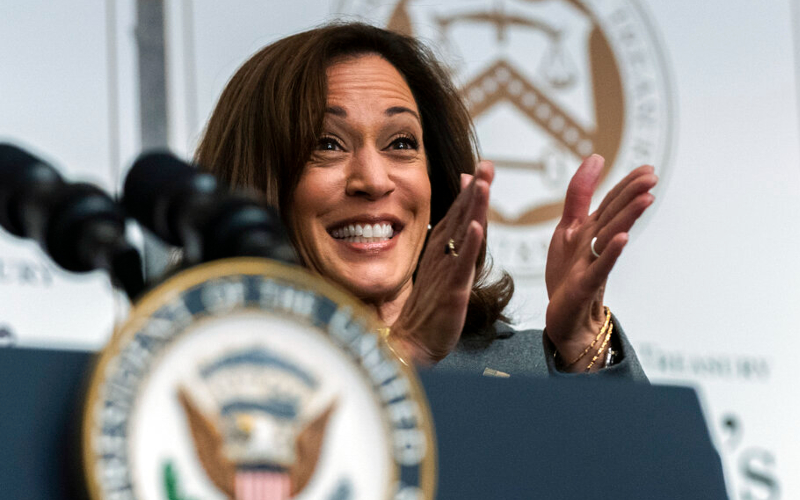If you’d have asked pollsters a month ago, it was game over for Democrats in the White House. But the storylines have dramatically changed since Joe Biden’s hapless debate, and his replacement — Vice President Kamala Harris — seems to be rewriting her unpopular past with a surge in recent polling.
With less than 100 days to go before the election, what do these numbers mean? And can we trust them?
The Left’s relief that Biden has abandoned his reelection bid has certainly played a big part in the boost Harris is enjoying against former President Donald Trump. In the early days of her campaign, the former California attorney general catapulted in the polls, hit rare air in fundraising with a $200 million haul, and became a mainstream media darling. But don’t be fooled, experts say. With inflation, the economy, and immigration topping the charts of voters’ concerns, the honeymoon can’t last forever. Kamala may be more coherent than Joe Biden, but she’s got more baggage than LaGuardia Airport.
Behind the scenes, Democrats are quietly fretting about the years of footage Republicans can use to remind Americans that Harris is, as Senator Tom Cotton (R-Ark.) recently called her, “a San Francisco liberal who cannot keep this country safe.” Even The New York Times was blunt about Kamala’s extremism, pointing out past obstacles that will “haunt” her, including her potentially fatal opposition to fracking, private health insurance, and the police. She’s also made jaw-dropping statements comparing Immigration and Customs Enforcement (ICE) to the KKK, supported legalized prostitution, and demanded Americans eat less meat.
The “archive is deep,” Republican strategist Bradd Todd told the Times. “We will run out of time before we run out of video clips of Kamala Harris saying wacky California liberal things. I’m just not sure that the rest of this campaign includes much besides that.” National Republican Congressional Committee (NRCC) Press Secretary Will Reinert agreed, telling Breitbart, “Harris’s 2019 primary campaign for president is a Republican ad maker’s dream and a swing-district Democrat’s nightmare.”
Her radical views are even more of a liability in the voting bloc she so desperately needs: swing states. As a Democratic senator told The Hill about Harris, “We need to be very clear-eyed, and it’s going to be brutally tough.” Reporter Alexander Bolton warned that “behind the public jubilation over Vice President Harris’s swift rise to become their party’s likely nominee for president, Democratic lawmakers are privately anxious about her prospects of defeating former President Trump, acknowledging she is largely untested as a candidate and faces serious challenges.”
In conversations with party leaders, the senator noted that “concerns are already bubbling up over Harris’s ability to connect as well as Biden did in 2020 with white working-class and union voters in three states that were critical to defeating Trump: Michigan, Pennsylvania and Wisconsin.”
“For her to become president, she’s going to have to be talking about issues that impact the 60% of Americans, working people who are living paycheck to paycheck,” insisted Senator Bernie Sanders (I-Vt.), who was ranked the second most liberal senator in the nation to Harris in 2019. And yet, as The Wall Street Journal points out, Harris’s numbers are neck-and-neck with Trump, noting that she has closed one important gap: enthusiasm.
“Only 37% of Biden voters were enthusiastic about him in early July and now 81% of Harris voters are enthusiastic about her,” said Democratic pollster Mike Bocian. “This is an astounding change.”
Even so, Bocian’s Republican counterpart in the survey, David Lee, urges the Left not to get too comfortable. “Harris faces significant headwinds,” the paper notes. “Her tenure as vice president is closely tied to a Biden administration record that includes a chaotic southern border, rising prices and protracted wars in the Middle East and Ukraine.”
FRC Action Director Matt Carpenter admitted that “Kamala Harris’s poll numbers are an improvement over Joe Biden’s in a head-to-head match-up against former President Trump. This is because the Democratic base is more enthusiastic about Harris than they were about Biden.” But let’s not forget, Carpenter reiterated, “She owns the Biden administration’s radical pro-abortion, anti-family agenda too. She has her own record from her time in the Senate and from her time in state government in California. As voters learn about her record,” he believes, “the shine will wear off.”
Scott Rasmussen, president of RMG Research and Editor-at-Large of Ballotpedia, urged similar caution. “I think it’s a mistake to say that Vice President Harris has gained a lot of momentum or reshaped the race,” he told Family Research Council President Tony Perkins on Monday’s “Washington Watch.”
“A better way to look at it is the numbers we’re seeing today are almost identical to the polling numbers we saw on June 26th. That’s right before Joe Biden had that disastrous debate. What that means is the popular vote is maybe a toss-up, maybe Trump ahead by a point or two. That means that he’s got the advantage in the key swing states.”
He used a baseball analogy to explain the state of play. “With Biden as the Democratic nominee, the Democrats were coming to bat in the bottom of the ninth, down by six or seven runs. With Harris as the nominee, they’re coming to bat still down, but only by a run or two. So it’s possible to see a path forward. But it’s not really a new race at this point.”
Of course, one thing the polls can’t tell us is how many voters each candidate will turn out. And that, as everyone acknowledges, is what will decide the election. With Harris leaning heavily on abortion, Perkins explained, it’s obvious she’s trying to mobilize and energize the base.
“Absolutely,” Rasmussen nodded. “[And] one of the challenges that Democrats have had this cycle is younger voters. And a lot of more progressive voters just aren’t all that excited about the Democratic team. So by focusing on those issues, on those hot-button base issues, they’re looking to get out that vote. And look, two years ago, they did a very good job of getting out the vote in certain districts.”
The difference now is, “voters tell us the top issue is inflation. The second most important issue [is] other economic concerns. And number three on the list is immigration. On all of those issues, President Trump is trusted far more than Vice President Harris is today or than President Biden has been. I think we need to be a little careful about those numbers. Let’s see what happens over the next couple of weeks as voters get to know Vice President Harris a little more. But right now, those issues are leaning very much against Vice President Harris.”
The longtime pollster had to chuckle at the New York Times headline that warned some of her past policy positions might not help her in this year’s campaign. “I thought that was one of the great understatements,” Rasmussen smiled.
In these next several weeks, there’s one number to focus on, he agreed, and that’s the intensity of both parties’ bases. “Before Vice President Harris became the presumptive nominee,” Scott explained, “the advantage was clearly on the Republican side. Right now, it appears to have reached a point where both sides have that same degree of passion. But again … one of the things that’s very difficult with President Trump in the race is figuring out who is actually going to show up and vote. As you and I have talked lots of times, that’s what really matters.”
What Democrats have to worry about, Rasmussen said, is the reality that “Donald Trump brings out people who don’t regularly vote. And the more they get to know about Vice President Harris, the more enthusiastic they will be about voting [for him].” On the other side of the aisle, they’ll trumpet the abortion issue, the Supreme Court, and other issues that will fire up their voters. “I do think the Republicans have the edge at this point,” he noted, “but it is far from over with 100 days to go.”
This article appeared originally here.
Notice: This column is printed with permission. Opinion pieces published by AFN.net are the sole responsibility of the article's author(s), or of the person(s) or organization(s) quoted therein, and do not necessarily represent those of the staff or management of, or advertisers who support the American Family News Network, AFN.net, our parent organization or its other affiliates.








